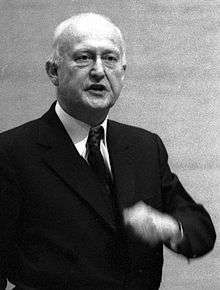Pierre Pflimlin
| Pierre Pflimlin | |
|---|---|
 Pierre Pflimlin in 1975 | |
| Prime Minister of France | |
|
In office 14 May 1958 – 1 June 1958 | |
| President | René Coty |
| Preceded by | Félix Gaillard |
| Succeeded by | Charles de Gaulle |
| 14th President of the European Parliament | |
|
In office 1984–1987 | |
| Preceded by | Piet Dankert |
| Succeeded by | Charles Henry Plumb |
| Personal details | |
| Born |
Pierre Eugène Jean Pflimlin 5 February 1907 Roubaix, Nord-Pas-de-Calais, France |
| Died |
27 June 2000 (aged 93) Strasbourg, Alsace, France |
| Political party |
Popular Republican Movement (1944-1966) Democratic Centre (1966-1976) Centre of Social Democrats /1976-1995) |
| Other political affiliations |
Union for French Democracy (1978-1995) |
| Religion | Roman Catholic |
Pierre Eugène Jean Pflimlin (French pronunciation: [pjɛʁ flimlɛ̃];5 February 1907 – 27 June 2000) was a French Christian democratic politician who served as the Prime Minister of the Fourth Republic for a few weeks in 1958, before being replaced by Charles de Gaulle during the crisis of that year.
Life
Pflimlin was born in Roubaix in the Nord department.
A lawyer and a member of the Christian democratic Popular Republican Movement (MRP), he was elected deputy of département Bas Rhin in 1945. With his personal roots in Alsace, Pflimlin numbered among his MRP party colleagues the Luxembourg-born Robert Schuman; for both, relations with Germany played an important role in their political thinking.
He held some governmental offices during the Fourth Republic, notably as Minister of Agriculture (1947–1949 and 1950–1951) and as Minister of Economy and Finance (1955–1956 and 1957–1958).
Prime minister of France
On 13 May 1958, the French National Assembly approved his nomination as Prime Minister. But the same day, riots took place in Algiers. The French generals in Algeria feared he would arrange for a negotiated solution with the Algerian nationalists giving them control of Algeria. They refused to recognize his cabinet. At this point the leading politicians deserted him, including Guy Mollet, Vincent Auriol, and Antoine Pinay. The crisis brought Charles de Gaulle as Prime Minister on 1 June.[1]
Subsequent public offices
Pflimlin was Minister of State until 1959. As Minister of Cooperation in 1962, he resigned with the other MRP ministers in order to protest against the euro-scepticism of de Gaulle.
Pflimlin served as the first Catholic mayor of Strasbourg from 1959 to 1983.
He also was the President of the Parliamentary Assembly of the Council of Europe from 1963 to 1966 and President of the European Parliament from 1984 to 1987.
Honors
The Pierre Pflimlin bridge over the Rhine south of Strasbourg, connecting France to Germany, is named after him and was opened in 2002.
Government (14 May – 1 June 1958)
- Pierre Pflimlin – President of the Council
- Guy Mollet – Vice President of the Council
- René Pleven – Minister of Foreign Affairs
- Maurice Faure – Minister of the Interior
- Pierre de Chevigné – Minister of Armed Forces
- Edgar Faure – Minister of Finance, Economic Affairs, and Planning
- Paul Ribeyre – Minister of Commerce and Industry
- Paul Bacon – Minister of Labour and Social Security
- Robert Lecourt – Minister of Justice
- Jacques Bordeneuve – Minister of National Education
- Vincent Badie – Minister of Veterans and War Victims
- Roland Boscary-Monsservin – Minister of Agriculture
- André Colin – Minister of Overseas France
- Édouard Bonnefous – Minister of Public Works, Transport, and Tourism
- André Maroselli – Minister of Public Health and Population
- Pierre Garet – Minister of Reconstruction and Housing
- Édouard Corniglion-Molinier – Minister for the Sahara
- Félix Houphouët-Boigny – Minister of State
Changes:
- 17 May 1958 – Maurice Faure becomes Minister of European Institutions. Jules Moch succeeds Faure as Minister of the Interior. Albert Gazier enters the ministry as Minister of Information. Max Lejeune succeeds Houphouët-Boigny as Minister of State.
References
- ↑ Robert Gildea, France since 1945 (1996) p 44
Further reading
- "The Little Plum" Time June 10, 1957
- Cook, Bernard A. (2001). Europe Since 1945: An Encyclopedia. Taylor & Francis. pp. 975–76.
- Morris, Peter. "Homo politicus; the political careers of Pierre Pflimlin and Jacques Chaban‐Delmas." Modern & Contemporary France 1.1 (1993): 42-44.